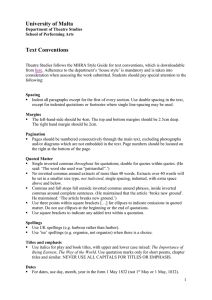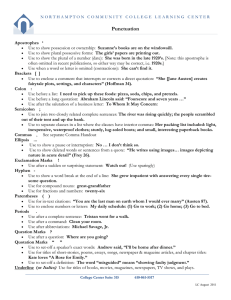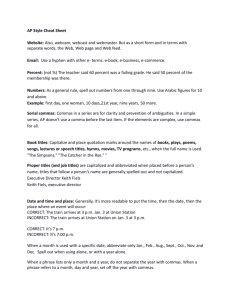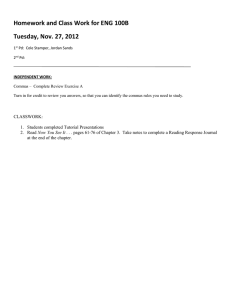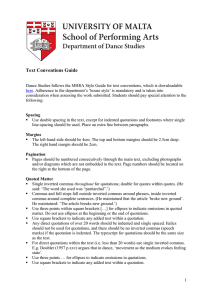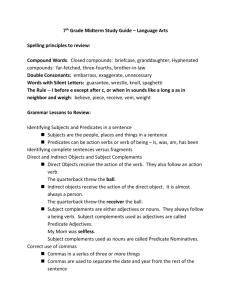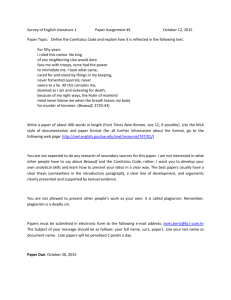University of Malta Text Conventions
advertisement
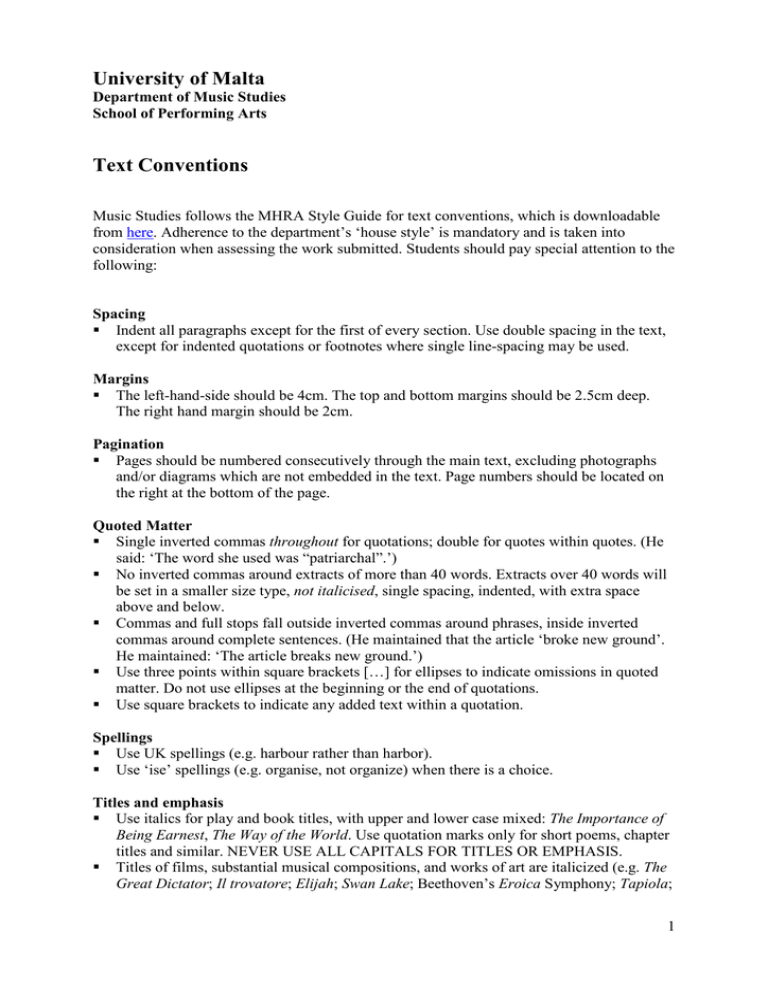
University of Malta Department of Music Studies School of Performing Arts Text Conventions Music Studies follows the MHRA Style Guide for text conventions, which is downloadable from here. Adherence to the department’s ‘house style’ is mandatory and is taken into consideration when assessing the work submitted. Students should pay special attention to the following: Spacing Indent all paragraphs except for the first of every section. Use double spacing in the text, except for indented quotations or footnotes where single line-spacing may be used. Margins The left-hand-side should be 4cm. The top and bottom margins should be 2.5cm deep. The right hand margin should be 2cm. Pagination Pages should be numbered consecutively through the main text, excluding photographs and/or diagrams which are not embedded in the text. Page numbers should be located on the right at the bottom of the page. Quoted Matter Single inverted commas throughout for quotations; double for quotes within quotes. (He said: ‘The word she used was “patriarchal”.’) No inverted commas around extracts of more than 40 words. Extracts over 40 words will be set in a smaller size type, not italicised, single spacing, indented, with extra space above and below. Commas and full stops fall outside inverted commas around phrases, inside inverted commas around complete sentences. (He maintained that the article ‘broke new ground’. He maintained: ‘The article breaks new ground.’) Use three points within square brackets […] for ellipses to indicate omissions in quoted matter. Do not use ellipses at the beginning or the end of quotations. Use square brackets to indicate any added text within a quotation. Spellings Use UK spellings (e.g. harbour rather than harbor). Use ‘ise’ spellings (e.g. organise, not organize) when there is a choice. Titles and emphasis Use italics for play and book titles, with upper and lower case mixed: The Importance of Being Earnest, The Way of the World. Use quotation marks only for short poems, chapter titles and similar. NEVER USE ALL CAPITALS FOR TITLES OR EMPHASIS. Titles of films, substantial musical compositions, and works of art are italicized (e.g. The Great Dictator; Il trovatore; Elijah; Swan Lake; Beethoven’s Eroica Symphony; Tapiola; 1 Die schöne Müllerin; Goyescas; The Haywain; The Laughing Cavalier; Epstein’s Christ in Majesty). Descriptive or numerical titles, however, take neither italics (except in a reference to a publication or recording) nor quotation marks (e.g. Beethoven’s Third Symphony; Bach’s Mass in B minor; Mendelssohn’s Andante and Scherzo; Piano Concerto no. 1 in B flat minor). Titles of songs and other short individual pieces are given in roman and within single quotation marks (e.g. ‘Who is Sylvia?’; ‘La Marseillaise’; ‘Mercury, the Winged Messenger’ from Holst’s The Planets). Dates For dates, use day, month, year in the form 1 May 1832 (not 1st May or 1 May, 1832). Use the twentieth century (or twentieth-century dramatists), not 20th or Century. Elide AD years to 2 digits (AD346–48, 1924–25), but do not elide BC years: 341–340 BC. Punctuation Footnote or endnote reference numbers should be inserted following any punctuation except a dash, and at the end of a sentence if possible: […] composed. Apostrophes. For modern names and classical names with a single syllable use Dickens’s, Jones’s, Zeus’s, etc. For classical names with more than one syllable, apostrophe alone (Eurpiedes’, Aeschylus’). Hyphens. Use adjectivally, as in ‘eighteenth-century architecture’, ‘the music-hall bill’, but ‘in the eighteenth century’, ‘going to the music hall’. A slow-moving actor (in distinction to a slow, moving speech). A well-made book (but: this book is well made). No hyphen in compounds with adverbs ending in -ly (for example: expertly written texts). Commas. Use Siddons, Kemble, and Kean, not Siddons, Kemble and Kean. Parenthetical Dashes. Use en dash with space before and after (the outcome – a delay in publication – was regrettable). Abbreviations and Acronyms A contracted form of a word that ends with the same letter as the full form, including plural -s, is not followed by a full stop (e.g. Dr, Jr, Mme, Mr, Mrs, St, vols). Other abbreviations take a full stop and are followed by a space (e.g. M. Dupont [Monsieur], Prof. J. Jones, pp. 106–09, vol. xix). Full stops are omitted for capitalised acronyms or similar abbreviations in general use (BBC, NATO, BC, AD). Capitals Minimum use (the king pondered, the Peloponnesian war, western influence, classical tragedy, ancient authors). Numbers Numbers up to and including one hundred should be written in words when the context is not statistical. In expressing inclusive numbers falling within the same hundred, the last two figures should be given, including any zero in the penultimate position: 13–15, 44–47, 100–22, 104–08, 1933–39. 2 Accents Minimum use (role, premiere, regime, elite in English usage, none on French capital letters). IMPORTANT NOTE: PLAGIARISM POLICY It is the student’s responsibility to be aware of the implications of plagiarism and of the University’s policy on the matter. See the ‘Plagiarism and Collusion Guidelines’. See also ‘How to Avoid Plagiarism’ fc & pc 12.2015 3
